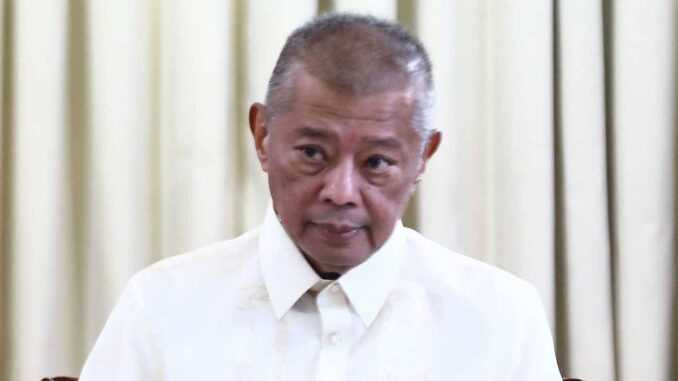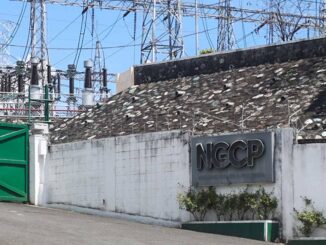
THE government has launched a massive manhunt for 11,000 illegal workers in the Philippine Offshore Gaming Operator (POGO) industry who failed to leave the country by the end of 2024 as directed.
Justice Secretary Jesus Crispin Remulla on Sunday issued a stark warning to these individuals, urging them to surrender or face severe consequences, including permanent blacklisting, deportation, and other legal penalties.
“The President is unequivocally clear that POGOs have no place here in the Philippines,” said Remulla. “This Administration will not waver in its resolve to protect the welfare and safety of the Filipino people.”
Justice Secretary Jesus Crispin Remulla. PHOTO BY MIKE ALQUINTO
The Department of Justice (DOJ), in collaboration with the Bureau of Immigration (BI) and other law enforcement agencies, is spearheading the crackdown. Dubbed a “guerilla-style campaign,” operations are being carried out to locate and apprehend illegal workers who have overstayed their visas or failed to comply with visa downgrading requirements.
The Bureau of Immigration (BI) will go after foreign nationals who have eluded deportation and continued to work for banned POGOs.Immigration Commissioner Joel Anthony Viado said the defiant foreigners “will be arrested, deported, and blacklisted. No exceptions.”
BI spokesman Dana Sandoval acknowledged difficulties in tracking down the workers, many of whom may be hiding in residential areas.
Sandoval warned the public against harboring ex-POGO workers, stressing that doing so constitutes aiding illegal aliens.
The Department of the Interior and Local Government (DILG) has begun inspecting commercial and residential establishments as part of business permit renewal activities to ferret illegal POGO sites.
Justice Undersecretary Felix Nicholas Ty highlighted the shift in the modus operandi of illegal operators.
Many have downsized operations, moving to provinces and less conspicuous locations, making enforcement more challenging.
“The syndicates persist in their operations, even in smaller and less profitable setups, because of the sunk costs in their infrastructure,” Ty said.
Some POGOs were reported to have resorted to “guerilla” tactics to stay in business, using resort hotels, restaurants and similar establishments as fronts.
The POGO crackdown was decreed by President Ferdinand Marcos Jr. in response to reports linking them to criminal activities such as online fraud, human trafficking and money laundering.
The BI has been coordinating with the Presidential Anti-Organized Crime Commission (PAOCC) and local law enforcement in locating and deporting the remaining illegal POGO workers.
‘PH citizenship not for sale’
In a related development, Sen. Pia Cayetano said the move of the Office of the Solicitor General (OSG) to cancel the birth certificates illegally obtained by foreigners showed that Philippine citizenship is “not for sale.”
Cayetano, chairman of the Senate blue ribbon committee, on Sunday lauded the OSG’s “decisive step” to cancel fraudulently acquired Philippine birth certificates of foreigners.
“The cancellation of these fraudulent documents sends a clear message: Philippine citizenship is not for sale,” Cayetano said in a statement.
“This is not just about documentation but also [about] our country’s national security,” she said.
Cayetano led last year the investigation on the reported issuance of birth certificates and other government identification documents (IDs) to foreigners, some of whom were POGO workers.
She said the Senate probe exposed “systematic fraud” in the local civil registration system, particularly in the issuance of birth certificates through late registration.
“Our investigation uncovered a disturbing pattern where foreign nationals, including those involved in illegal POGO operations, have exploited vulnerabilities in our civil registration system,” Cayetano said.
“The OSG’s move directly addresses the alarming findings of our blue ribbon committee hearings in March and August 2024, which revealed that Philippine citizenship is being sold, with some foreign nationals paying up to P300,000 for fraudulent government IDs,” she said.
She cited a case in Sta. Cruz, Davao del Sur, where it was discovered that 54 out of 1,501 suspicious birth certificates issued between 2016 and 2023 belonged to individuals with foreign parents.
The documents showed “identical penmanship and impossibly claimed that the same midwife attended births in various villages on the same days,” Cayetano said.
She called for sustained coordination between government agencies.
“While we welcome this step, we need proactive and sustained cooperation between the Philippine Statistics Authority, Bureau of Immigration, Department of Foreign Affairs, and local government units, specifically their local civil registries, to prevent similar schemes in the future,” she said.





Be the first to comment